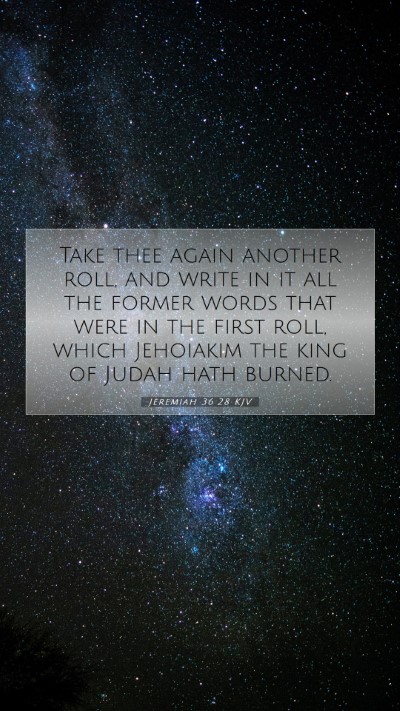Jeremiah 36:28 - Bible Verse Meaning and Commentary
Verse: Jeremiah 36:28 - "Take thee again another roll, and write in it all the former words that were in the first roll, which Jehoiakim king of Judah hath burned." (KJV)
Understanding the Context
Jeremiah 36 describes a pivotal moment in the ministry of the Prophet Jeremiah, where the word of God is manifestly rejected by King Jehoiakim of Judah. After the king burns the scroll containing God's message, God instructs Jeremiah to rewrite the words, showcasing His persistence in communication with His people.
Scripture Analysis
- Divine Instruction: The command given to Jeremiah to write again indicates God's unwillingness to forsake His people, despite their rebellion.
- Symbol of Rejection: The burning of the scroll signifies a deliberate rejection of God’s word, common in the lives of those who turn away from divine instruction.
- Restoration of God's Message: The act of rewriting emphasizes that even when the message is rejected, it can be restated and re-emphasized.
Bible Verse Explanations
This verse serves as a testament to the enduring nature of God's communication with humanity. Just as Jehoiakim attempted to destroy the words of God, individuals continually face the temptation to disregard spiritual truth. Yet God's resolve remains firm.
Insights from Public Domain Commentaries
Matthew Henry: Henry emphasizes the significance of the scroll as a means of communication from God. He highlights how the king's actions contrast with the need for humility before God's word and the call to embrace divine correction.
Albert Barnes: Barnes provides a view on the repercussions of King Jehoiakim's act of burning the scroll, underlining that God's will cannot be thwarted by human actions. He also notes how God's patience persists, seeking to engage with his people even after rejection.
Adam Clarke: Clarke focuses on the implications of this verse for understanding prophetic ministry. It serves as an example of the ongoing struggle between divine revelation and human obstinacy. Clarke illustrates that the persistent nature of God's involvement signifies His love and intention to guide and correct.
Application to Daily Life
In contemporary times, this verse underscores the importance of heeding biblical truths, even in a society that often seeks to dismiss or distort them. Believers are reminded of the necessity to embrace the word of God and to be open to correction, as spiritual growth often requires facing uncomfortable truths.
Historical Context of the Verse
Jeremiah's prophecies took place during a critical time for Judah, marked by idolatry, moral decay, and impending judgment. Understanding the historical background is crucial for grasping the urgency and seriousness of God's messages through Jeremiah.
Cross References
- Jeremiah 1:9: The calling of Jeremiah and the divine commissioning to speak God's words.
- Jeremiah 23:29: God's word is likened to fire and a hammer, illustrating its power and authority.
- Isaiah 55:11: Affirmation that God's words will accomplish what He intends, not returning to Him void.
Conclusion
Jeremiah 36:28 provides a powerful lesson in the persistence of God's message amid human rejection. Through historical and textual analysis, believers can gain profound insights into the significance of embracing biblical teachings. This verse not only highlights the themes of divine communication and human rebellion but also encourages individuals to remain receptive to God’s guidance and the transformative power of His word.


